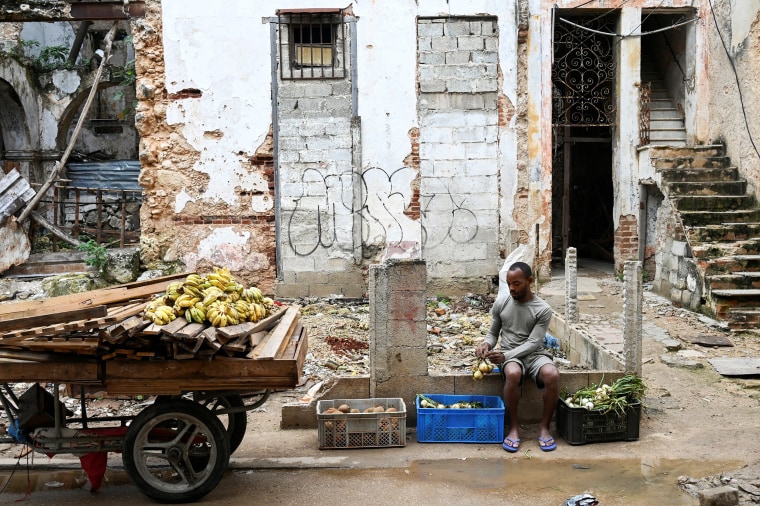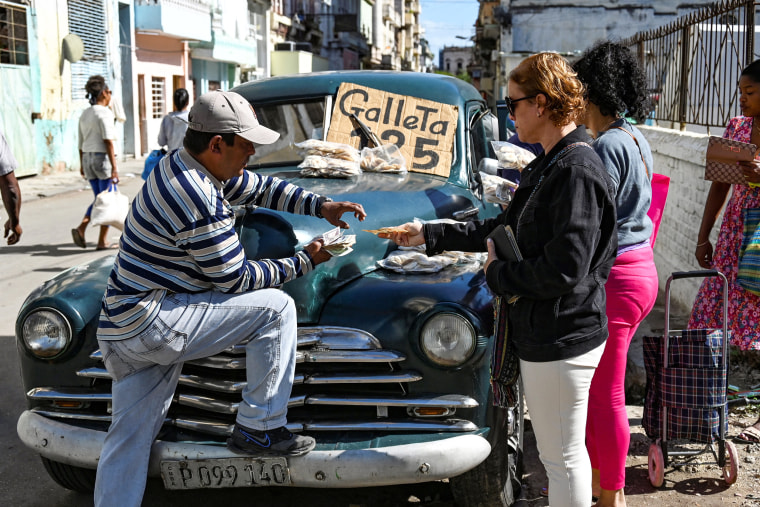HAVANA — Cuba announced tough economic measures for 2024 that include raising prices for fuel and basic services, cutting subsidies and placing restrictions on the emerging private sector, alarming ordinary Cubans.
The changes, announced Wednesday and set to be implemented in 2024, would be some of the most significant modifications to the communist-run island’s economy in years.
Prices for water, electricity, liquid gas, transportation and fuel will rise in the coming year. Homes that consume the most electricity will experience 25% increases, and the price of water will triple for some households. Some of the changes, particularly for electricity, could greatly affect those who operate small businesses from their homes.
At a gas station in Havana, Cuba’s capital, people expressed alarm Thursday over what is going to happen when the price hikes kick in.
Jorge Castro, a driver who works for the state, had already spent two hours in line to fill his tank and was still halfway to the pump. “It’s hard, because they’re going to raise gasoline prices, but we’re still going to have the long lines,” he said, referring to the gas shortages.
Alexis Velíz, a private-sector worker, said: “It’s going to affect a lot of people in Cuba, because not everyone will have the money to pay for gasoline. It’s going to have great impact, because everything is going to be even more expensive. It’s a cycle that is going to worsen inflation.”
One of the noteworthy changes is moving away from subsidizing staples and products — such as rice or sugar — and instead providing subsidies for people in need.

Shortly after the 1959 revolution, Cuba rolled out the monthly ration book, known as the “libreta” (notebook), and provided all Cubans with heavily subsidized staples like eggs, rice, coffee and sugar. Though the rationed food is not enough to last a month, for those who depend on a minimum monthly salary of about $17 U.S., the subsidies are a lifeline. Under the announced measures, only those deemed vulnerable would qualify for food subsidies.
Ricardo Torres, a Cuban economist and fellow at American University in Washington, D.C., said that if they are implemented, the changes would represent a move away from the island’s centrally planned economy.
He said the late leader Fidel Castro’s policy was: I am the owner of everything, but I also provide for everyone.
“But is the government now going to allow Cubans to do everything they can to guarantee their income?” Torres asked. “The answer is no, because there is an enormous amount of restrictions that impede the growth of the private sector.”
Torres said part of the objective is to control the country’s high inflation and fiscal deficit. Cuba has been paying its deficit by printing money, which in turn has contributed to inflation.
Prime Minister Manuel Marrero presented the Macroeconomic Stabilization Plan, as it is dubbed, before the National Assembly.
Marrero promised to continue to allow the creation of private enterprises. Cuba lifted a ban in 2021 on small- and medium-sized enterprises, often called “mipymes” in Spanish. But he warned that measures would be taken to further control them, saying the government initially made mistakes.
Government officials in the past have linked the private sector to inflation, which Torres disagrees with. He said mipymes cover a space the state does not provide for.
Omar Everleny, an economist based in Cuba, said the complexities the island faces cannot be solved in one year.
“You cannot solve the macroeconomic distortions and imbalances in Cuba in 2024,” Everleny said. “It’s evident that Cuba has more than an economic recession; it’s an economic crisis. It’s a problem with production, with supply. I don’t see an integral development plan that is needed with a focus on production.”
Economy Minister Alejandro Gil said this week that the economy possibly shrank this year by around 1% to 2%. In 2020, the year of the pandemic, it shrank by 11%.
"In 2023, Cuba's real GDP is similar to the one it had in 2013," Torres said. "It has lost a decade of growth."
Cubans have been facing extreme shortages in food, medicine, fuel and power for the past few years. Inflation has risen sharply, and it is now at 30%. The economic situation has led to once-unimaginable public shows of discontent, as well as to the biggest emigrations in Cuba’s history. Almost 425,000 Cubans crossed the U.S.-Mexico border in the past two years, close to 4% of the population.
The government blames tough economic sanctions initially imposed by former President Donald Trump and largely continued under President Joe Biden, as well as the coronavirus pandemic, for the GDP contraction. The country depends heavily on imports for food and other goods.
Cuban President Miguel Díaz Canel posted Thursday on X, formerly Twitter: “we have already said it: nothing absolutely nothing of what we do is to [negatively] affect people. Our principal task is economic recovery. The measures announced yesterday will give a necessary jump to the economy. We will make more Revolution and more Socialism."
Orlando Matos reported from Havana and Carmen Sesin from Miami.

